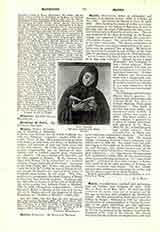

Maurus, SYLVESTER, writer on philosophy and theology, b. at Spoleto, December 31, 1619; d. in Rome, January 13, 1687. He entered the Society of Jesus, April 21, 1636. After finishing his course of studies and teaching humanities at the College of Macerata, he held in the same place the chair of philosophy for three years, and subsequently in Rome for several years. Then he was promoted to the chair of theology at the Roman College, and remained in this position for a considerable number of years. For a period he was also rector of the latter institution. The mental endowment of Father Maurus was a happy combination of the speculative and the practical turn of mind. His doctrine was noted for its soundness and solidity; at the same time, he constantly put in practice St. Paul’s principle, “not to be more wise than it behoveth to be wise, but to be wise unto sobriety”. Though he was a good philosopher and theologian, he was a better religious. Those well acquainted with him are convinced that he never lost his baptismal innocence. Neither his holiness nor his learning made him a disagreeable companion or an undesirable friend. It would be hard to say whether he was more admired or loved by those who came into contact with him.
The following works of Father Maurus deserve mention: (I) “Quaestionum philosophicarum Sylvestri Mauri, Soc. Jesu, in Collegio Romano Philosophiae Professoris”. This work is divided into four books, and appeared at Rome in 1658. A second edition was issued in 1670. The latest edition, in three volumes, is prefaced by a letter of Father Liberatore, and appeared in Le Mans, 1875-76. (2) “Aristotelis opera quae extant omnia, brevi paraphrase, ac litterae perpetuo inhaerente explanatione illustrata”. The work appeared in six volumes, Rome, 1668. The second volume, containing Aristotle‘s moral philosophy, was edited anew in 1696-98. The whole work was published again in Paris, 1885-87, by Fathers Ehrle, Felchlin, and Beringer; this edition formed part of the collection entitled “Bibliotheca Theologise et Philosophiae scholasticae”. (3) “Quaestionum theologicarum 11. 6”, published at Rome, 1676-79; this work contains all the principal theological treatises. (4) “Opus theologicum”, published in three folio volumes at Rome, 1687, treats of all the main questions of theology accurately, concisely, and clearly. The first volume contains some information concerning the author, and also his picture engraved by Louis Lenfant.
A. J. MAAS

